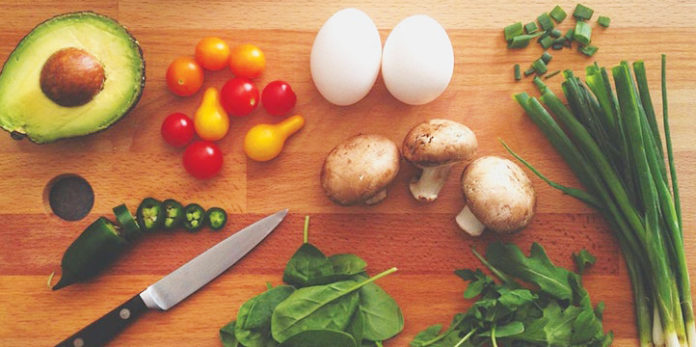Risa Mori
Staff Writer
On March 6, the UC Santa Barbara (UCSB) Food Citizenship Campaign hosted its first ever Eco Iron Chef at The United Methodist Church, an hour-long cook-off competition turning donated food into savory meals to promote the accessibility and excitement behind zero waste food options. The event was held at a Campus 880, a space utilized by the church in which tables of food, utensils and cooking equipment were laid out. Ten participants were randomly divided into four teams, and were asked to create a dish using the secret ingredient revealed in-person: corn.
Teams chose from various ingredients in the categories of vegetable, grain, canned goods, and herbs to formulate their recipes. The Eco Iron Chef event was spearheaded by Jack Greenberg, a fourth-year cultural anthropology major at UCSB and Global Food Initiative fellow under the sustainability department at UCSB. The event is just one of many in a series of consumer education workshops that address what Greenberg calls “food citizenship.”
“Food citizenship is the daily actionable things that people can do in their own lives to help bring about a more just and equitable food system,” said Greenberg in an interview with The Bottom Line. “The workshop series are easy things that people can do to try to reduce the community’s food waste.”
After given the signal to start, participants had approximately 30 minutes to cut vegetables, cook ingredients, and present their dishes in a visually pleasing manner. Despite a minor issue with the induction cooktops, the event ran smoothly as teams brainstormed creative ideas for the final products.
With the call from the judges that time had run out, the four teams revealed their dishes — three teams had variations of a vegetarian taco, and one team made a Southwestern-style stew. In proper Iron Chef fashion, each dish was presented and critiqued by judges representing the Food Citizenship Campaign and UC Department of Health and Wellness. Each dish had its pros and cons, but at the end, it was declared that everyone was a winner. The event concluded with a potluck-style tasting session and participants were free to take home any food.
The Eco Iron Chef event is a trial-run for a similar event that will be held in the Student Resource Building this upcoming April according to Mallory Russell, a health educator with the Department of Health and Wellness focusing on food, nutrition, and basic skills. The UC Department of Health and Wellness played a role in lending equipment and funding Greenberg’s workshops.
“We’re big supporters and do a lot of programming with the food bank and different sustainability groups on campus,” said Russell. “We want students to know how much power they have to think on the fly and make beautiful dishes with simple ingredients.”
Greenberg highlighted four local resources that address food insecurity and help reduce food waste. Food on Wheels collects food items from residents in Isla Vista that are donated to the Associated Students Food Bank. Backyard Bounty gathers leftover produce from backyards and gardens in the Santa Barbara area. FoodCycling at UCSB focuses on food recovery in the campus community. Lastly, Food Not Bombs is a volunteer movement that shares free vegan and vegetarian meals with the hungry.
The Food Citizenship workshops are designed to impart skills and knowledge that participants can apply to their daily lives. Eco Iron Chef is one step toward the initiative’s goal of not only teaching students how to get creative with leftovers, but also raising awareness of greater initiatives to reduce the community’s food waste by transporting food that isn’t going to be eaten into the hands of people who need it.











